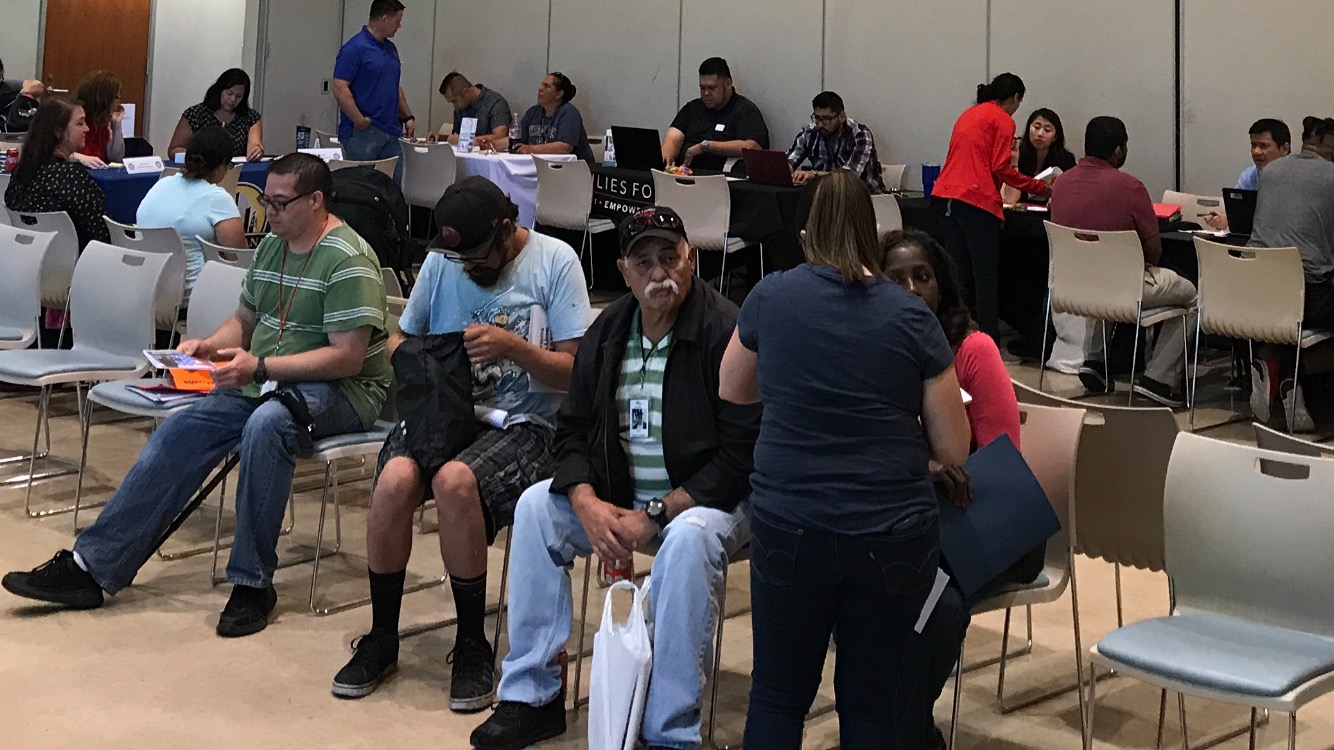
As Orange County’s homeless population gets larger, the Long Beach Veterans Administration hospital has been hosting housing fairs for homeless veterans, intending to get them housing or connect them to county services.
One such event happened on Thursday, Aug. 29, at Mission Viejo’s Norman P. Murray Community and Senior Center, where VA workers asked homeless veterans a series of questions to determine their eligibility for VA-supported housing subsidies and healthcare services.
“I get a retirement payment but that’s not enough,” said Vern Fleming, an 85-year-old Vietnam War veteran who’s been homeless for 14 years. “No money.”
Fleming was there for housing, and his difficulties echoed those of many other veterans in the room. Many say they felt left behind and are struggling to afford the astronomical cost of living in Orange County.
Other veterans, such as former Marine Cliff Turner, simply wanted to see if they qualified for VA benefits and didn’t expect too much.
“I’m taking it one step at a time,” said Turner, who’s been homeless for 20 years. “I’ll get in the computer and take it from there.”
After the RePlanet recycling plant closures, Turner lost his only source of income. He wanted to see if the VA could offer him financial assistance or food stamps. He used to receive disability checks for manic depressive disorder, which hindered his ability to work.
If a veteran was not eligible for the Housing and Urban Development-Veteran’s Affairs Supportive Housing program, or HUD-VASH, he or she was referred to a non-veteran’s housing service such as the OC Housing Authority, which issues Section 8 housing vouchers for low-income people.
The HUD-VASH vouchers offer to pay for market-rate housing for veterans, but they also require case management to help provide homeless veterans with services such as mental health counseling and addiction treatment should they need them.
However, Long Beach VA Director of Public Communications and Relations Richard Beam acknowledged that subsidies landlords could receive through the voucher may not always be up to date with the market
“What I need is landlords that are willing to say ‘I want to support, and I’m going to offer my property and accept the voucher,’” said Beam, who added that landlords should think about “patriotism, not the economy.”
VA Social Work Supervisor Paul McDonough supported Beam’s assertion that the biggest hurdles for homeless veterans getting housing are landlords.
“The biggest one (problem) is being able to find landlords that accept them,” McDonough said. “Landlords get to be choosy and charge high amounts of money.”
McDonough elaborated by saying that he sees landlords hesitate to accept HUD-VASH vouchers nor agree to rent out to veterans transitioning out of homelessness because they don’t want to risk losing money should the veteran relapse into any of the issues that might have contributed to their homelessness.
Orange County’s point in time count states that there are 311 homeless veterans currently in Orange County, but Beam said that there are many more who were not counted, either because they chose not to identify as a veteran, or they simply weren’t found.
The homeless veterans at the housing fair skewed older, with a few exceptions, because younger homeless veterans tend to accept less help and be less visible, according to McDonough.
Beam said that of the 80 homeless veterans they spoke with, 52 qualified for HUD-VASH.
The housing fair was held in South County, which contains the fewest amount of homeless people in Orange County, and the previous two events were in North and Central County. To get homeless veterans to the housing fair, the VA had a van service ferrying people to the location from wherever they may be in Orange County.
The Long Beach VA has been coming to Orange County since January to alleviate the homelessness crisis, which Beam has unfortunately dealt with in his personal life. His brother, a homeless Navy veteran, committed suicide around 25 years ago.
“If the will of the county was then what it is now, he would still be alive,” Beam said.
To help homeless veterans, Orange County announced in July the Marching Home strategy aiming to end veteran homelessness by December 2020, after securing $2.9 million in state funding.
“Some of it is being put into landlord incentive programs; the bulk of it will be put into actual ground up construction (of veteran housing),” said 5th District Representative Lisa Bartlett. “You couple that with private sector funding and then county funding and pretty soon you’ve cobbled together a lot of dollars that we can utilize to push out into significant progress.”
Some of that construction includes the Santa Ana and Placentia Veteran’s Villages, which the county says will be completed in March and August of 2020.
As of press time, Orange County has yet to secure the private and county funding for the Marching Home project.
“I’m cautiously optimistic because it seems so doable,” Beam said. “If the constituents in Orange County really wanted to do this, if there ever were a time we could succeed it’s now. But I’m not drinking the Kool-Aid yet.”

An editorial intern and news junkie with a hankering for all things spicy, Jackson gained a passion for journalism writing about housing and homelessness in the Bay Area for the Daily Californian and the Tenderloin Tribune. When not writing, Jackson can be found rambling to anyone who listens about old movies no one else cares about. He can be reached at [email protected].


If you serve, you should be provided free housing for life!
Thank you for writing this article. To many people do not understand what vets go through. Often people think only combat vets are the ones with PTSD. In the four years I was in the military I almost got killed three times and never fired a shot in anger. We as a country have been in war nonstop since Vietnam. Enough of this BS. And again Jackson, thank you.
Thank you Assemblywoman Cottie Petrie-Norris, who secured the 2.9 million for our OC veterans. There is much work to be done, but these funds will certainly help.
https://www.unitedwayoc.org/news/assemblywoman-cottie-petrie-norris-secures-2-9-million-to-house-orange-countys-homeless-veterans/
Thanks for sharing. I read many of your blog posts, cool, your blog is very good. https://www.binance.com/ar-BH/register?ref=FIHEGIZ8